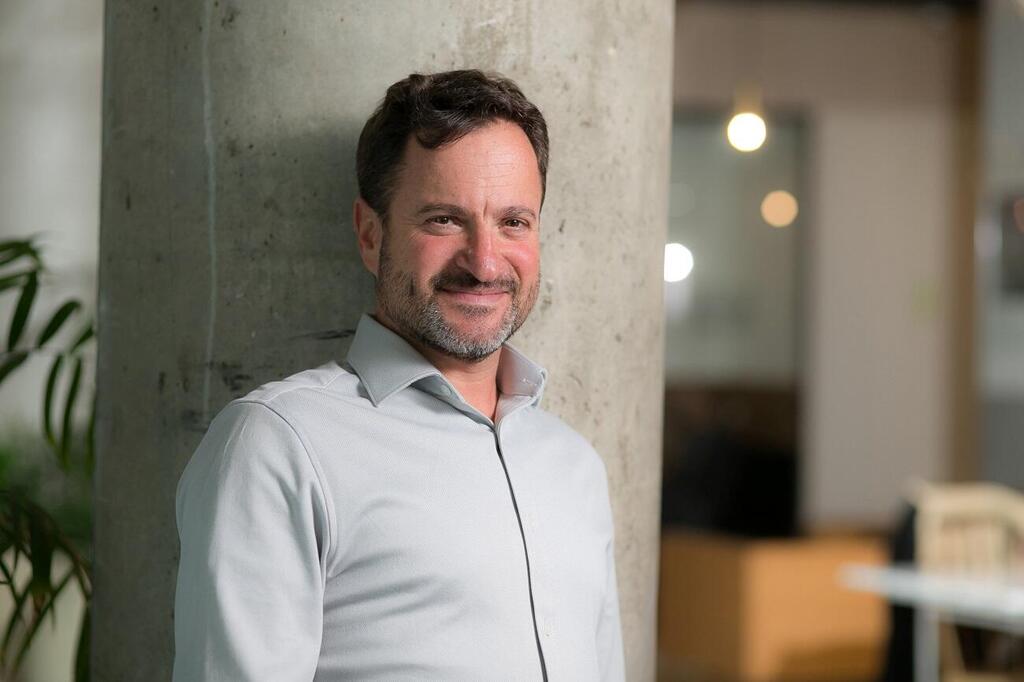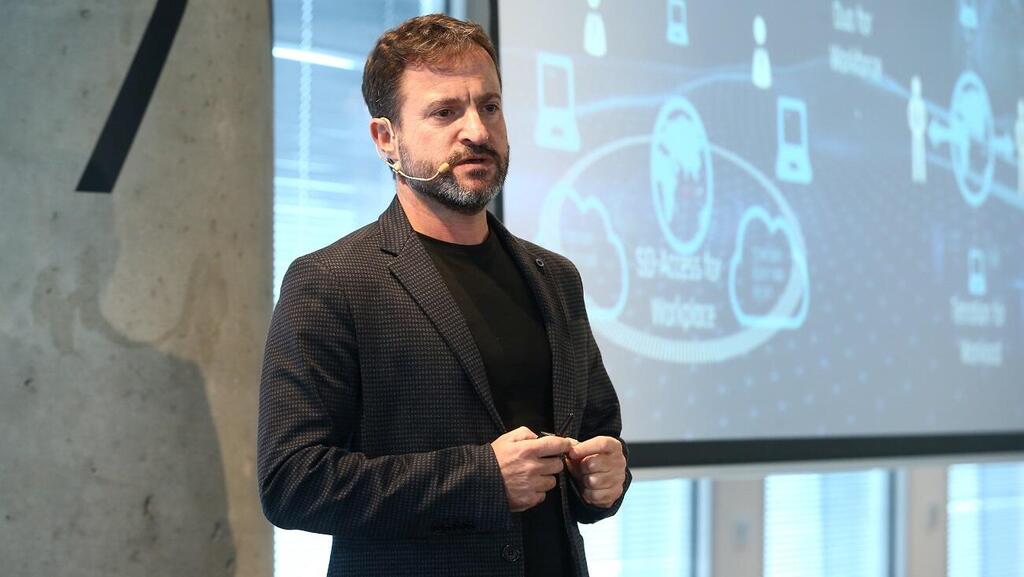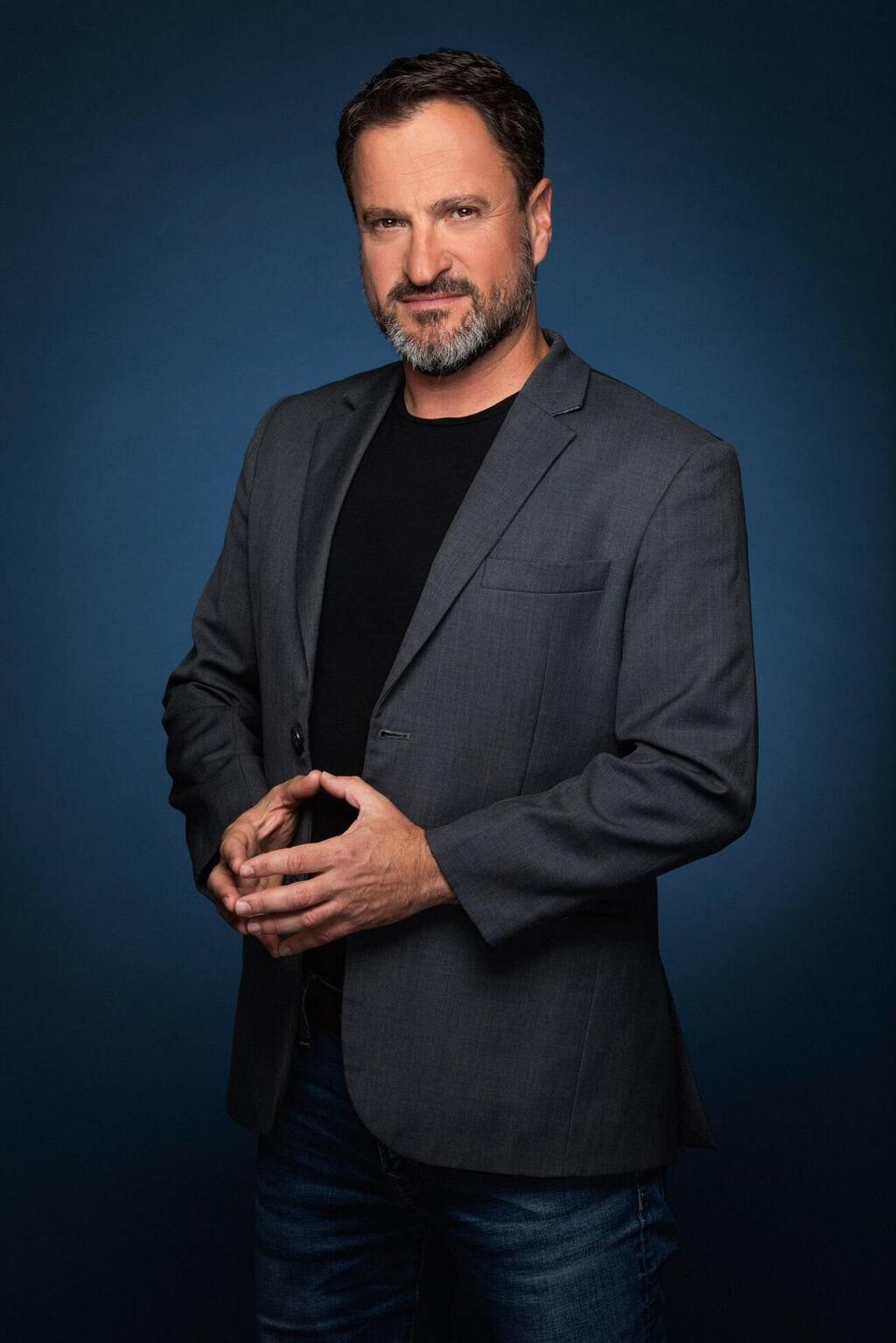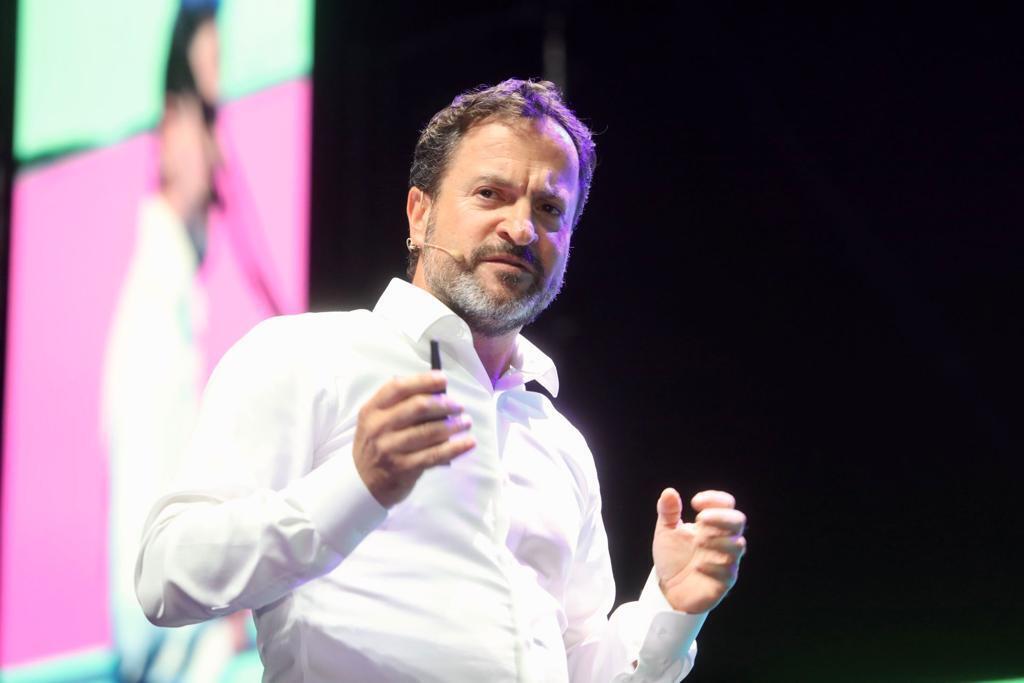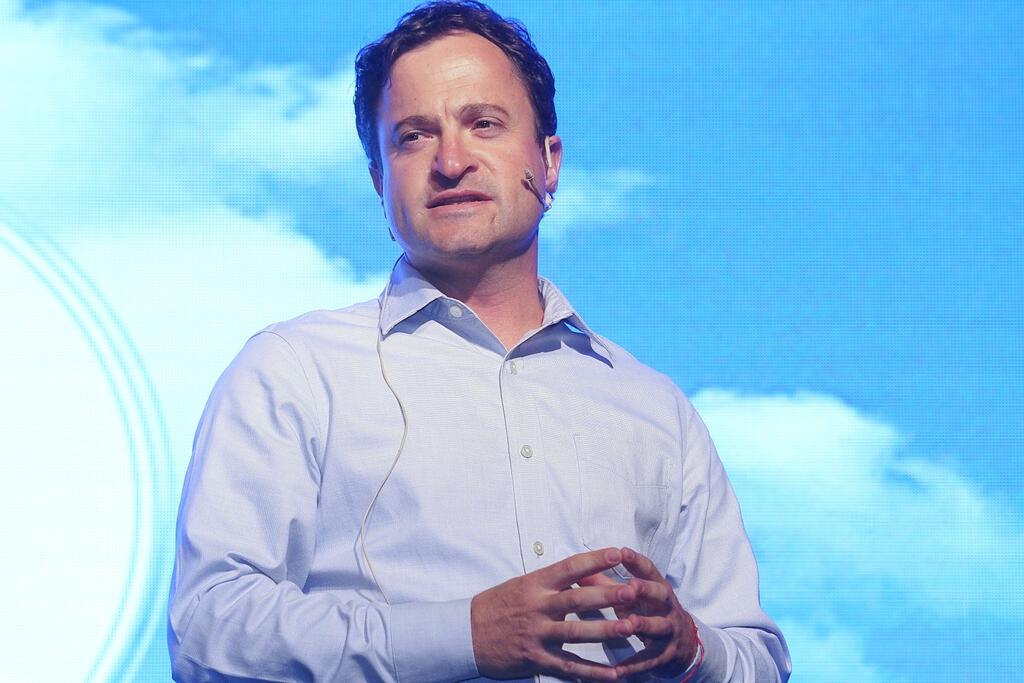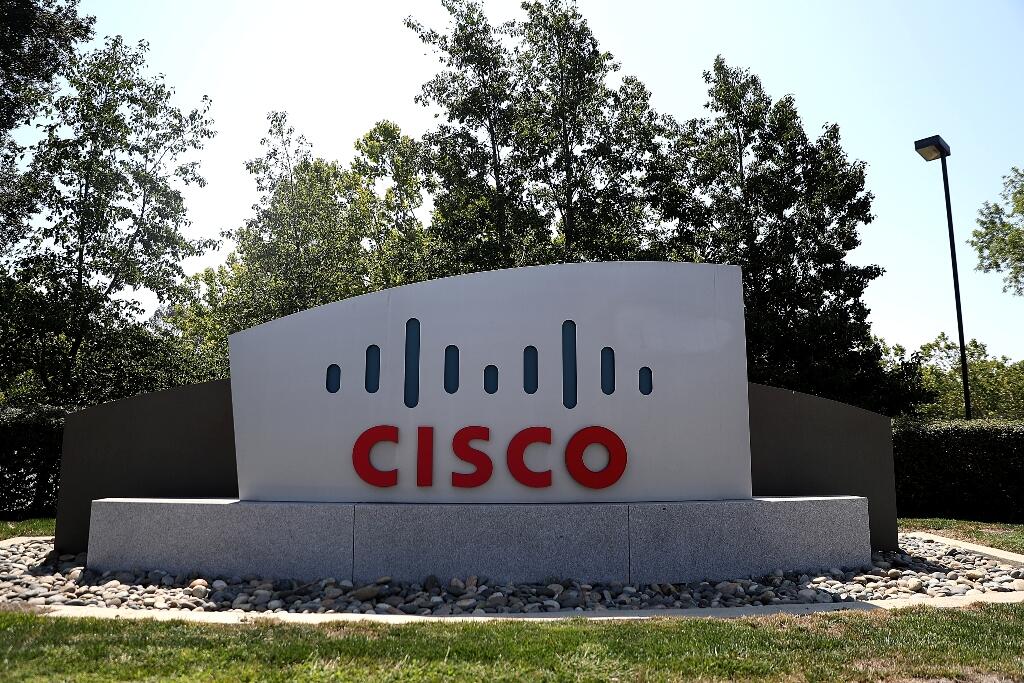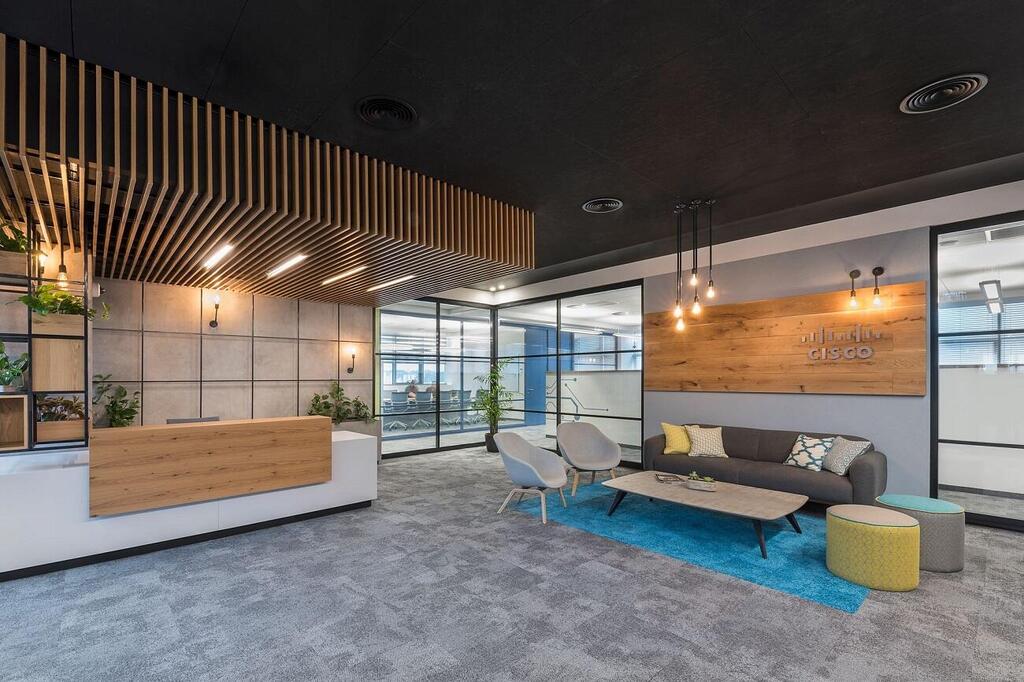Getting your Trinity Audio player ready...
When you're an ordinary person concerned about artificial intelligence, you worry that ChatGPT will type out a document in a minute that would have taken you a whole day to write. It also doesn't get tired after lunch or require additional training. But when you're Oren Sagi, the CEO of Cisco Israel, which takes care of 85% of the global internet flow, you have other worries to think about.
More stories:
"We're facing a big bang in the relationship between humans and machines. Many new industries and opportunities are emerging, but on the other hand, there are new threats like cyber security," says Sagi. "Attackers are using artificial intelligence tools for much more sophisticated schemes, like identity theft. The attacker reads my emails, learns how I phrase emails, and now can write to my marketing manager telling him the budget is approved."
“Although I did not send the email, it comes from my address and is worded exactly as I word my other emails. Another example is in the deepfake world — they upload a video to the web showing Oren Sagi standing in front of employees and saying there is a new huge company being built in Israel, when it’s all fake. But no one knows it is. It happened a few weeks ago with Putin, supposedly telling Russian citizens to evacuate their homes. That's why responsible artificial intelligence (Responsible AI) —is our social responsibility as Cisco and as an industry. We also have to narrow the gaps that AI will create."
What gaps?
"Take, for example, a teenager from the social and geographic periphery, who wants to be part of the startup nation. In the past, the gaps were expressed in internet access and having a computer for every child. Today, the gap is only growing wider when a child who grows up in an affluent town in the center of the country, with artificial intelligence - while another child is not even connected at all to these systems."
Because they don't even have basic English skills to write instructions for a language model.
"They don't have English, and then they won't have the tool of artificial intelligence that summarizes lessons for them or the tool that creates instructional videos. Kids in Israel’s central region have tools that provide them with a significant advantage."
Where does this revolution find you as an employer? IBM's CEO said that 7,800 positions in the company would be replaced by AI.
"Global Cisco employs 86,000 workers and is engaged in innovation development, and unlike IBM's CEO, we say something different: that this is an amazing time to continue expanding, that ChatGPT won't replace workers but will work alongside them, and accordingly and that we are acquiring companies at a pace we've never done before."
No other alternative
Cisco, the California-based IT company that started as a merger of scientists at the University of Cambridge who created the first router and exchanged love messages using pings, is one of the largest technology corporations in the world with a sales revenue of $52 billion.
Its market value is estimated at around $225 billion, which is notably higher than Intel, for example, which is also considered one of the largest employers in Israel. At the peak of the dot-com bubble, Cisco reached a market value of over half a billion dollars, surpassing Apple and Microsoft, and for a few weeks, it was considered the world's most valuable company.
Cisco entered Israel in 1997 and currently employs 800 workers in Netanya, Caesarea, and Tel Aviv. It serves customers of all types, from fast-food chains and accounting offices to law firms, and even the arms of the Israeli government, the military, security agencies, hospitals, banks, and insurance companies.
In recent years, Cisco had positioned itself as an eager purchaser of Israeli companies. Only the mega deal of Mobileye's sale to Intel for $15.3 billion, topped the value of its acquisitions. Today, it stands at 18 acquisitions in Israel, totaling about $7.6 billion, four of which were made in the past two years.
Cisco Israel was recognized as a global development center for Cisco's global cloud security, and the question of how a company from San Jose, California, with all its venture capital, startups, and leading universities like Stanford just a ten-minute drive away, had chosen a small place like Israel, is intriguing.
"It's true that Cisco has headquarters in California, and there's no shortage of venture capital, startups, and leading universities there, like Stanford, just a ten-minute drive away," says Sagi, who has been CEO of Cisco Israel for the past eight years.
"But it's a fascinating story; how such a giant corporation recognizes that in a small country like Israel, you can find high-quality workers. In the past 20 years, Cisco harnessed the country‘s innovation, which is based on the military, competent academia, and the Israeli ecosystem."
Now the judicial overhaul is looming over both Israel and Sagi’s company. In recent months, Sagi's private Facebook page has been filled with pictures of him at protests, waving the Israeli flag. But unlike other CEOs in the tech industry, who appeared on panels in news studios, called on their employees to take to the streets, and warned of alarming scenarios, Sagi is aligning with corporate discipline and cooling the flames. He responds negatively when asked if top executives at global Cisco are concerned about the situation in Israel.
"These aren’t the worries I hear. I'm also well acquainted with the ecosystem I'm living in and all the parallel companies to mine, and this is not what I'm seeing. The local struggle we see in Israel is of less interest to the American corporation today. There, they are greatly preoccupied with what's happening in the U.S. - the shifts in the American political system between Republicans and Democrats.”
“My colleagues and I, CEOs of multinational companies, encounter the questions of American corporations less often. Of course, the headlines don’t show Israel in a kind light, and it doesn't matter if you're right-wing or left-wing, religious or secular. In the end, I believe that there won't be a resolution here in the internal struggle, but only external ones necessitated by Iran or Hezbollah. We have no choice but to grow something good out of the chaos if we want to live in a flourishing country," he says.
Do you think Cisco doesn’t see a risk in acquiring companies operating in a country with an unstable legal system?
"For a company like Cisco, there is a great responsibility for developing its businesses and leading technologically. We will acquire the most suitable companies to do so, whether they are located in California or India. To the outside world, Israel is seen as a democracy struggling to keep its nature.”
“I don't think that anyone in the U.S. truly understands the nuances of the override or reasonableness clauses. As CEOs in Israel, we have a responsibility to call for dialogue, calm the tension, and create a framework that will allow us to continue living well as a nation despite the complex situation. In my capacity as the CEO of the Israel-America Chamber of Commerce and as a senior manager in an American company, I’d say that we mustn’t ignore the importance of our relationship with a strategic partner like the United States."
Is there a concern that other corporations won't establish R&D centers in Israel in light of the situation?
"Israel has a very strong technological base, especially in innovative technology that gave rise to the startup nation. Our responsibility should be to ensure this continues in the future. In order for that to happen, we will need to work very hard to reach a dialogue and return to normalcy. It's true that multinational companies are looking at what's happening in Israel, but I’m an optimistic person, I can’t help it. It's easier to be a CEO when you see the future in tinted lenses."
Perhaps you're being diplomatic because governmental bodies are major customers of Cisco?
"No, everyone is a customer of Cisco. There's no one in the Israeli market who isn’t our customer, and that's not my perspective."
You seem relatively cautious compared to your counterparts in the tech industry.
"My perspective is through the lens of alternatives, and we have no alternative. My call, even on my private Facebook and Instagram pages — I'm everywhere except TikTok — is for dialogue."
You call for dialogue, which has so far not succeeded. Where do we go from here?
"If fail to make a decision, whether it's option A or B, our enemies will make it for us. We have no choice but to unite the various sectors of Israelis. The divide that has grown in recent months, is the biggest danger to the country in my eyes."
Are you allowing your employees to demonstrate?
"We employ hundreds of workers in Israel from all walks of life, and we aren’t disconnected and elitist, despite what some believe. We respect the right of employees to protest; they do it on their own time."
Are more employees asking about relocation?
"Relocation is such a dramatic, personal, and familial decision that it's bigger than just the matter of the judicial overhaul. I don't see an increase in requests for relocation, and usually, these requests are employment-based."
Unorthodox
Sagi who is 51-year-old started out as a lawyer who was meant to work in his father's law firm. The days of the dot-com bubble and the need to be at the forefront of the business world led him to change direction. "I studied law and business administration at Reichman University. I had a multidisciplinary nature from the start, which should be true for all students today.”
“You need to have well-rounded skills, an understanding of finance and marketing, even if you want to be only a lawyer or a programmer. I started as a specialist in intellectual property and commercial law, and around the beginning of the 2000s at the time Lucent acquired Chromatis for $4.7 billion. I appeared as the litigator in in front of a judge who barely read the statement of claims that I worked on for three weeks, and after flipping through it said, 'Alright, what do the sides have to say?'” I realized that I was wasting my time in a job that did not allow me to follow my passions, Although I still find the law to be an amazing profession and still use my ability to understand contracts, taxes, and business limitations as a CEO."
Sagi’s entry into the high-tech world was at Bynet Data Communications. "I decided to transition to tech knowing I wanted to stand at the forefront. Not to represent a client, or be a consultant, but to truly lead. Those were the days of the dot-com explosion. The transition happened when I was 28, and even though I didn't come with a technological background, the company was the right place for me to develop.”
“I completed a three-month specialized tech course, learning everything I needed to know in this complex world. After that, I had an entrepreneurial bout in 2008, with a partner, where we developed business for Israeli companies in Europe."
In his career, Sagi managed to work at weapon developer Elbit Systems, then returned to the Bynet Group when he was called to manage its international activity. He continued to Gilon Business Insight, which was acquired by Ness, and in 2010, he moved to Cisco. Five years later and was appointed CEO.
What did you want to be at 28 when you entered tech?
"A CEO," he answers. "I always wanted to be in the management world, to lead companies and people. When my children are asked what I do, they answer that dad meets people for coffee. I spent too many years on the move, in large parts of my career, I found myself living on airplanes, to the point that you fly out in the morning and come back in the evening. It was a chaotic period which I don’t miss, especially when you have three young children. My work-life balance had no balance at all."
Sagi learned this lesson the painful way. Today, he lives in Ra'anana, raising three children with his wife Tali. He enjoys driving off-road in his jeep, running, and horseback riding. "I completed a skipper course during the pandemic. In November, I have a half marathon in Eilat planned with my daughter. I try to do yoga, and invest in my health and fitness.”
“My father worked as a lawyer, he worked 24/7 and he never took care of himself. At the age of 54, he had a heart attack. To this day, he is cognitively impaired. It happened when I was in my first semester of studies and it pushed me hard to succeed.”
“Suddenly, when I was 22, I found myself in financial hardship while caring for my father, when I initially wanted to study law to work with him in the firm. It changes your world. At some point, you feel like everything is falling apart, and you want to fix it. At night, I worked at the Israel Electric Corporation on their security staff, and during the day, I dozed off at the university.”
“This is where my hunger for success grew, because I came from a situation where I had nothing, and I wanted to prove to myself that I could create something from scratch. But at the same time, I realized I didn't want to be where my father was and to do that, you need to manage your stress and take things in proportion.”
And yet, a significant part of your adult life has found you in offices and on airplanes.
"When I started my career in Israeli high-tech, in the early 2000s, I didn't know the term 'balance,' I worked until 11 pm every night. I missed some of my roles as a father"
What did you miss and when did you realize it?
"My perception changed. I realized the importance of managing a career alongside parenting rather than in place of it. In 2014, I negotiated a large deal in New York and was missing my daughter's 6th-grade graduation party. That's when it hit me and since then, I think I've become a great father.”
“I found myself lecturing at a valedictorian ceremony and spoke to the students about it. I strongly believe that industry leaders are responsible for allowing the employees to find their own balance between work and family, friends, and hobbies."
And there's also your father, who inspired your mental fortitude which pushed you to move on to become a CEO.
"Not exactly. I think my military service during the Lebanon War and the Intifada, in a unit with a high workload like in the IDF’s Armored Corps, built my emotional resilience. To be a commander at a young age and an officer at the age of 20, that builds resilience."
You've been with a giant corporation like Cisco for many years, did you ever consider trying to start your own company?
"I found in Cisco a company with great influence in the technological, business, and social content world. Cisco’s influence over the world and in Israel – with a market value of $220 or $240 billion – isn’t comparable to the impact of a startup, no matter in which field it operates. Take, for example, the fact that all Israeli government offices today use Cisco equipment for video calls."
Israeli-made chips
A look at Cisco's latest financial report reveals how much of the potential of artificial intelligence is already being translated into revenue growth. The company anticipates that the peak demand for AI-related products will be reached by 2025. In the meantime, products have already been ordered for sums nearing half a billion dollars, including the Silicon One chips, tailored for the workloads of AI projects, which were developed in Israel.
"It's a boost to Israeli pride. 'Silicon One' is the most powerful networking chip in the global industry, and they're developed here in Israel, at Cisco Caesarea, and are in high demand. The Silicon One chip enables fast and robust modern communications, allowing for global AI traffic. Much of the global traffic today passes through the chips developed by Cisco in Caesarea and demand is increasing."
Cisco is primarily associated with communication infrastructures, an area often considered less glamorous despite the company's significant success. "Cisco is a strong brand, but it's primarily associated with the communication sector, whereas to enjoy the existing technological richness in the world today, we use a multitude of artificial intelligence engines within our systems.”
“Cisco has four main channels of activity: transformation in the infrastructure world; the infrastructure of our global customers, like data centers; connectivity; and how to connect every user from every organization to one another. Another area is the hybrid work world, which COVID-19 greatly accelerated. In order to enable remote work, you need a digital platform and infrastructure, like high-quality internet and data security. When it comes to organizations, the questions that come up are for example: how to change a bank's trading room, so that traders who work opposite the stock exchange, can work from their homes
Organizations are trying to bring employees back to the office these days. Look at Elon Musk's and his tweet: "get off the work-from-home bullshit.”
"I believe in the hybrid model, both in the technological world and in employment. When looking at the job market’s future, there’s a growing demand for flexibility by both employees and employers.”
“A hundred percent remote work provides full flexibility - but it impairs brainstorming, the coffee corner discussions, and the creation of an organization's DNA. On the other hand, hybridity allows the employee flexibility while avoiding the need to commute to work every day. At Cisco, we believe in the hybrid model and let the employees decide where they work from."


